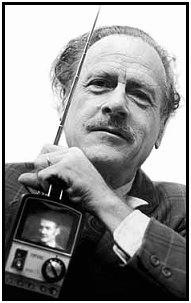McLuhan, Web 2.0 Master
Marshal McLuhan was a remarkable soothsayer. He could spout off the most amazing proverbs, riddles, one-liners and contemporary koans. In a moment of zanity, I designated McLuhan as Wired’s Patron Saint on the masthead of the first issue, and the moniker stuck. The nickname is somewhat an inside joke because McLuhan was very Catholic. And he worked much like an anointed oracle. He’d lay on a couch and recite ideas while his disciples recorded what he said.

I recently came across a perceptive McLuhan quote via Andrew Keen’s Cult of the Amateur:
In the 1950’s Marshall McLuhan proposed a reality television show in which corporations would present their major problems to a mass audience. “For every expert idea that arises inside an organization,” McLuhan advised executives, “the public has a thousand better ideas than you ever heard of.”
This eerily parallels the current dogma of Web 2.0. In fact, McLuhan’s statement is almost the canonical definition of crowdsourcing. The key difference, is that in McLuhan’s day, the thousand of better ideas from people you never heard of were unattainable in practice. They were out there, but there was not efficient way to harness them.
As Clay Shirky explains in his brilliant book new “Here Comes Everybody: The Power of Organizing Without Organizations”, published 50 years after McLuhan, this is what the new social media of Web 2.0 changes. It lowers the costs of finding, matching and exploiting those McLuhan-ish loose ideas out in the marketplace, and makes them actionable. Shirky writes:
Because of transaction costs, organizations cannot afford to hire employees who only make one important contribution — they need to hire people who have good ideas [for them] day after day. Yet as we know, most people are not so prolific, and in any given field many people have only one or a few good ideas, just as most contributors [on Flickr] documenting the Mermaid Parade or Hurricane Katrina contribute only one photo each. .. As a result, many good ideas (or good photos or good music) are simply inaccessible in an institutional framework…As Bill Joy, one of the founders of Sun Microsystems, once put it, “No matter who you are, most of the smart people work for someone else.” What the open source model does is to allow those people to work together.
Shirky’s book is filled with more succinctly argued points like this. I recommend it. And there’s always more McLuhan. He’s usually right and wrong at the same time. This is from a 1965 New York article by Tom Wolfe called “What If He is Right?”
For that matter-the drop-out generations will even get rid of the cars, says McLuhan. They will work at home, connected to the corporation, the boss, not by roads or railroads, but by television. They will relay information by closed-circuit two-way TV and by computer systems. The great massive American rush-hour flow over all that asphalt surface, going to and from work every day, will be over. The hell with all that driving. Even shopping will be done via TV. All those grinding work-a-daddy cars will disappear. The only cars left will be playthings, sports cars. They’ll be just like horses are today, a sport. Somebody over at General Motors is saying — What if he is right?


